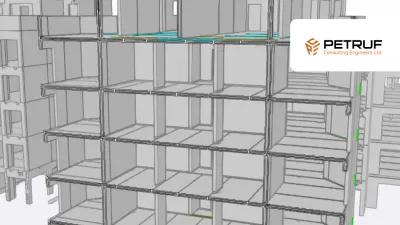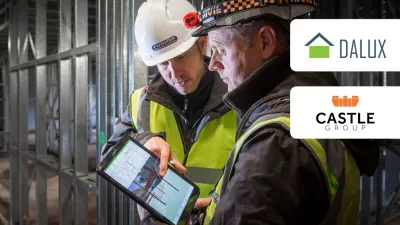Taking Timber Frame Construction Off-Site with Automated Manufacturing
Building with timber has a new look thanks to Modern Methods of Constuction. Building in off-site, automated manufacturing facilities is an opportunity to streamline the steps between digital design and timber frame assembly. Cygnum Offsite Builders typifies this move to more efficient production with MMC.
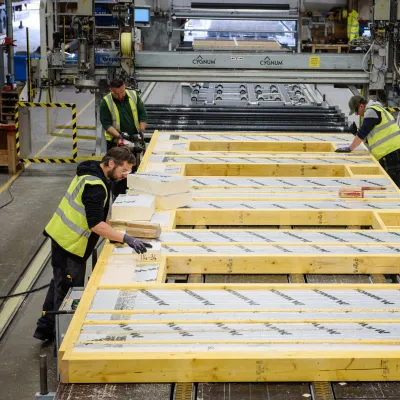
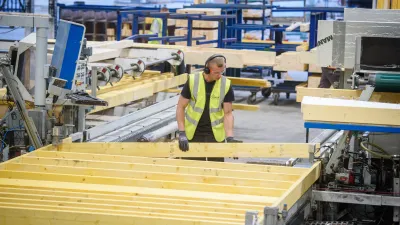
Building with timber in Ireland is an obvious choice. Timber is sustainable as it can be harvested and the carbon output negated by growing more timber. It’s thermally efficient, flexible for a range of designs, and plentiful. Indeed, forestry company Coillte reported in 2021 that “Ireland is one of the best places in the world to grow trees”. Timber is also the main material for off-site residential building in the Irish market.
Established in 1997, Cygnum Building Offsite is one of Ireland's leading off-site timber manufacturing companies. Cygnum’s production system is built on traditions of skilled carpentry combined with advanced manufacturing principles and digital design. Indeed, Heber McMahon, Director of Sales for Cygnum, claims that the Cork-based company has developed a very unique timber frame design and assembly process.
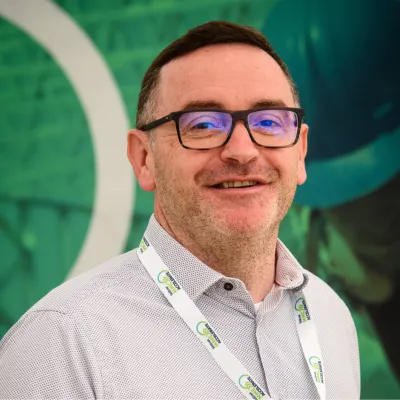
“I’m confident in saying that we have one of the most automated off-site construction factories in Ireland, certainly in the timber frame space. What we are doing is bring the efficiencies of process-driven system in our production facility to the construction site. By using automation, we are bringing a quality consistency to all our projects that clients gain a great deal of security from.”
Director of Sales for Cygnum
Optimising production has been years in the making. Many of Cygnum’s senior staff have seen multiple iterations of upgrades to factory plant and processes. The gradual automation of production means Assembly Workers now work in tandem with designers and can access updates to technical specifications in real time. Cygnum also worked with Lean specialists to optimise the flow of data and materials on the floor, helping the company reach its current output of six timber frame units per day.
“When it was all paper, any changes meant time lost in locating the relevant file and applying changes to the actual build. Even the time spent up and down the stairs to the office was time lost. Gone now are the tape measurers and pens. Now, both sides of production have access to all the information in real time.”
Director of Sales for Cygnum
Tom McLoughlin, Senior Design Coordinator for Cygnum, is the key link for the design and manufacturing teams, managing quality checks and inter-team communication. He excels in this quality assurance and project coordination role thanks to the upskilling he completed in sustainable building and digital construction technologies.
Starting out as a carpentry apprentice, Tom qualified shortly following the 2008 recession – not a lot of opportunities for a young carpenter.

“I love carpentry, I get a kick from practical work. But I knew I would need to ‘recession-proof’ myself too. So, I studied Sustainable Building & Renewable Energy at TUS [Technological University of the Shannon]. While studying, Cygnum had an Open Day and that was it. Working with them would keep me close to carpentry and I could use what I learned about sustainable building.”
Senior Design Coordinator for Cygnum
Tom spent months training in their construction software and production processes. He also studied BIM and Revit at Munster Technological University at the same time, to adapt to his new role in digital design. As he became more experienced, Tom wanted the chance to focus more on the sustainability side of Cygnum’s production process. The company paid for him to study as a Certified Passive House Consultant through the Passive House Institute, a move which still informs the quality checks he performs.
“When I was studying there was no mention of MMC, and now the concept is inescapable. All the training I received from Cygnum has helped to shape my skills and my role. You're dead in the water if you don't invest in your people.”
Senior Design Coordinator for Cygnum
Tom added that, based on his carpentry experience, anyone who has learned a trade would be ideally suited to the move into MMC.
“I feel well placed to champion tradespeople, specifically carpenters, who want to upskill and move into MMC. In my experience, tradespeople are highly qualified, skilled, and motivated, have an advantage when embarking on upskilling – particularly because they already possess a deep understanding of construction fundamentals, practical problem-solving, and adapting to real-world challenges. These attributes form a firm foundation for embracing MMC, where precision, adaptability, and a practical mindset are key to success.”
Senior Design Coordinator for Cygnum
Heber noted that internal training has been developed and adapted to include more machinery operation and CNC skills as production became more automated.
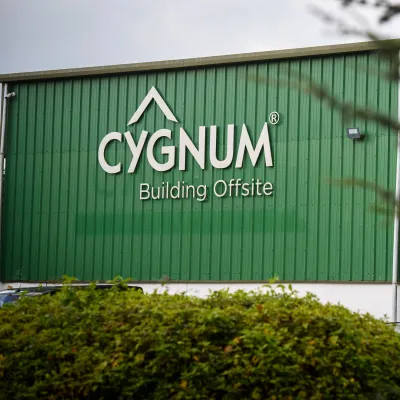
“New staff are often General Operatives from a traditional construction background. We first train them in our production process and MMC generally. Then they will work across the various workstations, specialising in one station first and then expanding out until we have multi-skilled staff available to slot into any part of production. This can take up to a year but means they understand our assembly process more holistically and can be re-deployed to any part of it.”
Director of Sales for Cygnum
Heber also noted that Cygnum trainers have completed ‘Train the Trainer’ courses, to improving the teaching of key concepts of the in-house automated production process.
This streamlined construction process has been a key appeal for building partners. For CField Construction, another Cork-based company, using Cygnum’s off-site fabrication system, alongside project management tools such as Last Planner, have helped them to halve construction timelines on a recent project.
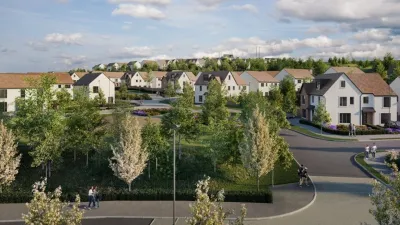
Ballyvolane, a 753-unit site just outside Cork, has attracted interest from politicians and city councillors as a project significant to the housing stock of the city. CField contracted Cygnum to manufacture timber frames and panels for the project. By utilising off-site construction, CField could coordinate groundworks and install ancillary services on the Ballyvolane site while Cygnum manufactured the timber units.
Heber noted that Cygnum’s delivery of units for the Ballyvolane project was so measurable that “CField could plan each subcontractor to come to site weeks in advance with no delays. They could always trust a new unit would arrive on time.” Briane Greene, Associate Director of CField Construction, praised this seamless approach that combines off-site fabrication with traditional building with timber.

“There is a real benefit to working with MMC – Cygnum were able to deliver four houses a week for the project. There will be a time soon when we stop calling it 'Modern' Methods of Construction’ and it just becomes a part of the norm.”
Associate Director of CField Construction
For Brian, and CField as a company, the Ballyvolane project has been an eye-opening for the opportunities with off-site construction. In a career spanning close to a decade on building projects in Africa, before a stint in with CField in London, Brian is relishing being back in Ireland and seeing the construction sector embracing MMC more.
“The industry is fragmented; it needs something to pull everyone together. We have a gap in our knowledge, as a sector, about MMC. But I can see that changing. We are certainly encouraging clients focused on traditional methods of construction to embrace MMC more. We want to prove to them what it is capable of.”
Associate Director of CField Construction
For Cygnum, the future looks bright. Current renovations and an expansion of its production facility in Macroom will double its capacity. It also means new opportunities for building professionals to work in Modern Methods of Construction and learn something new about a form of building that has been around for thousands of years.
“I found studying later in life much more fulfilling. It made more sense in the context of my working life and the basic concepts of building had changed a lot too. The future of construction will be defined by MMC, it’s the way it’s going.”
Director of Sales for Cygnum
